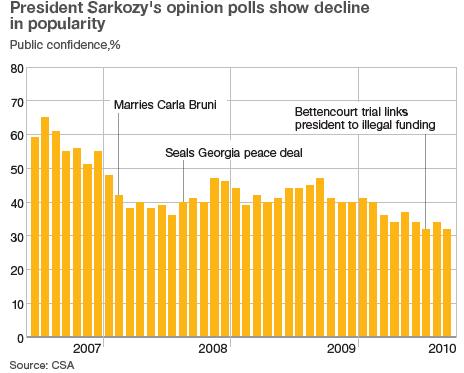French strikers step up pressure on Sarkozy
- Published
The BBC's Christian Fraser reports from the scene of a protest march in Paris
More than one million people have taken to the streets of France in a sixth national day of action against planned pension reforms, officials say.
Strikes have hit transport and education, 4,000 petrol stations have run dry and police have clashed with protesters in several cities.
Shops were looted in Lyon and cars were set on fire in a Paris suburb.
President Nicolas Sarkozy appealed for calm but insisted he would press ahead with plans to raise the retirement age.
He told a news conference in Deauville that it was his duty to focus on the "troublemakers" and ensure that public order was guaranteed.
"The biggest oversight would be to not do my job and to not ensure the financing of retirement pensions for today and tomorrow," he added.
Union officials called on transport workers to extend their walk-out into Wednesday.
Sixth strike
Marchers set off during the afternoon from Place d'Italie in the south of Paris - one of more than 250 demonstrations in towns and cities across France.
The interior ministry said that 1.1 million demonstrators had taken to the streets across the country although the CGT union said the number was 3.5 million.
The day of action was being seen as a last attempt to mobilise protesters before the Senate's final vote on the government's pension reforms.
The street protests on Tuesday were comparable with the previous week's national day of action, although police and unions gave widely differing numbers.
In Paris, the unions estimated that 330,000 demonstrators had taken to the streets but police put the number at 60,000.
Fuel supplies
Although the planned increase in the retirement age from 60 to 62 and the full state pension age from 65 to 67 is widely unpopular, the scale of disruption is beginning to affect large parts of society.
A blockade of France's 12 oil refineries is hitting fuel supplies hard.
Energy Minister Jean-Louis Borloo told MPs that just under 4,000 petrol stations out of a total of 13,000 were awaiting supplies.
A third of the country's departments (local authorities) were said to be experiencing shortages.
In Normandy in northern France, 12 petrol stations were taken over by the authorities for use by emergency services.
Prime Minister Francois Fillon announced plans to end the shortages within four or five days, by asking the main oil companies to share their reserves to replenish stocks at petrol stations around the country.
Petrol Industries Association president Jean-Louis Schilansky said more lorries would be brought into service and foreign hauliers would be hired if necessary.
Public transport was also hit, with half the scheduled flights in and out of Orly airport in Paris cancelled because of a one-day walk-out by air traffic controllers.
Trains on the Paris Metro were heavily crowded as only about half the services were running and national rail operator SNCF said as many as three-quarters of its fast regional trains had been cancelled.
School blockades
Education was also affected: the education ministry said 379 secondary schools were either blockaded by pupils or had suffered some disruption, the highest number since the protests began at the start of September.
In some areas, schools became a focus for violence. Outside a secondary school in the Paris suburb of Nanterre, youths threw stones at police who responded with tear gas.
For the second day running, cars were overturned and set alight in Lyon. There were also disturbances in Mulhouse and Montbeliard in eastern France.
Presidential popularity
Despite the widespread disruption, the strikers continue to attract popular support with one opinion poll suggesting that 71% of those surveyed back the industrial action.
However, people using public transport in the northern city of Lille appeared less happy.
Insurance worker Frederic Deraed said the French should no longer think it was still acceptable to stop working at 60.
But Olivier Sekai, of the General Confederation of Labour (CGT), said he saw support increasing for the protests.
President Sarkozy's poll ratings appear to have dropped even further as he tries to tackle the wave of protests.
One poll for BVA conducted on 15 and 16 October suggested his approval rating was down to 30%, the lowest for three years.
The number of French with either a negative or very negative opinion of their president rose five points from September to 69%.

- Published10 November 2010
- Published19 October 2010